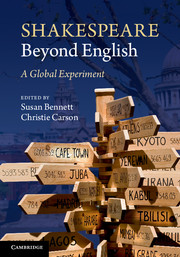Book contents
- Frontmatter
- Contents
- List of Illustrations
- List of colour plates
- Notes on contributors
- Foreword
- Acknowledgements
- Introduction
- The Globe to Globe Festival: An Introduction
- Performance Calendar
- Week One
- Week Two
- Week Three
- Week Four
- Chapter Twenty-Three Shakespeare 2012/Duchamp 1913
- Chapter Twenty-Four Foreign Shakespeare and the uninformed theatre-goer
- Chapter Twenty-Five The right to the theatre
- Chapter Twenty-Six ‘Playing’ Shakespeare
- Chapter Twenty-Seven Romeu e Julieta (reprise)
- Week Five
- Week Six
- Afterwords
- Index
- Plate section
- References
Chapter Twenty-Five - The right to the theatre
The Belarus Free Theatre's King Lear
Published online by Cambridge University Press: 05 June 2014
- Frontmatter
- Contents
- List of Illustrations
- List of colour plates
- Notes on contributors
- Foreword
- Acknowledgements
- Introduction
- The Globe to Globe Festival: An Introduction
- Performance Calendar
- Week One
- Week Two
- Week Three
- Week Four
- Chapter Twenty-Three Shakespeare 2012/Duchamp 1913
- Chapter Twenty-Four Foreign Shakespeare and the uninformed theatre-goer
- Chapter Twenty-Five The right to the theatre
- Chapter Twenty-Six ‘Playing’ Shakespeare
- Chapter Twenty-Seven Romeu e Julieta (reprise)
- Week Five
- Week Six
- Afterwords
- Index
- Plate section
- References
Summary
On 4 July 2012, the skies over Ivyanets – a small town 70 kilometres outside Minsk, the capital of Belarus – changed unpredictably. Brown teddy bears attached to parachutes canopied the streets and demanded the attention of the locals. The bears clutched protest signs in English and Belarusian between their paws: ‘You cannot silence us’ and ‘Free speech now’. The airdrop, initially bound for Minsk, was meant to scatter free-speech signs over the presidential palace of dictator Alexander Lukashenko. Since 1994, Lukashenko has maintained his grip on power through such repressive tactics as censorship, vote-rigging and state violence. He operates as if the Iron Curtain that divided east and west Europe during the Cold War had never been lifted, and continues to run the country like a Soviet state. This includes the use of military and police – including the secret KGB service – to silence citizens who question his regime. At the hands of Lukashenko, Belarus' most prominent opposition leaders, journalists, political activists, lawyers, academics and artists have faced imprisonment and torture, ‘disappeared’ without warning and ‘committed suicide’ on the eve of presidential elections. The unlikely campaigners of the more than 800 teddy-bear airdrop were not, however, Belarusian citizens. They were Studio Total, a Swedish advertising firm, who describe their action as ‘a performance to support democracy in Belarus’. This performance from above prevented a direct encounter with the despotic regime from below. It was at street level that a Belarusian journalism student, 20-year-old Anton Suryapin, did what young people just about everywhere do and posted the images online. This banal act of post-and-circulate resulted in the forced detention of Suryapin by the KGB, who now accuse the student of ‘assisting illegal entry’. Studio Total had illegally crossed into Belarusian airspace to campaign for Charter 97, an online organization that reports human rights abuses from inside Belarus, and the authors of the country's 1996 ‘Declaration of Resistance against Belarusian Dictatorship’.
- Type
- Chapter
- Information
- Shakespeare beyond EnglishA Global Experiment, pp. 195 - 207Publisher: Cambridge University PressPrint publication year: 2013

